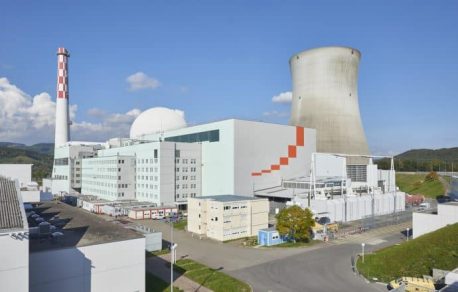Quality assurance errors relating to some fuel rods in the Leibstadt Nuclear Power Plant
A few days ago, Leibstadt Nuclear Power Plant (KKL) informed the Swiss Federal Nuclear Safety Inspectorate (ENSI) that some fuel elements do not fulfil the requirements of the applicable specifications. Accordingly, KKL decided to replace them for safety reasons. The safety of man and the environment was ensured at all times.
 Isolated quality assurance errors have occurred at the responsible fuel element manufacturer. This means that individual fuel elements used in the KKL reactor partially contain fuel rods which do not meet the specified requirements.
Isolated quality assurance errors have occurred at the responsible fuel element manufacturer. This means that individual fuel elements used in the KKL reactor partially contain fuel rods which do not meet the specified requirements.
In Switzerland, only Leibstadt Nuclear Power Plant is affected. ENSI issued clarifying statements immediately. The supplier of the fuel elements concerned is not the manufacturer of the elements exhibiting increased oxidation in KKL.
In total 22 fuel elements are affected in KKL, of which 16 have not yet been used, and six have already been inserted in the core for three or four operating cycles, respectively. An operating cycle lasts about a year. Accordingly KKL has decided to replace these fuel elements. “We welcome this step, since it aims at maximising safety” states Ralph Schulz, Director of the Safety Analyses Division.
Safety ensured at all times
The KKL reactor core comprises 648 fuel elements with a total of around 62,000 fuel rods. According to the information available thus far, only a small fraction of the fuel rods in the six fuel elements not conforming to specifications were affected by the quality-related incident. In total, around 0.045 percent of the rods contained in the KKL reactor core are affected. There was no damage in the six fuel elements during their previous period of insertion.
Under a worst-case assumption that all affected fuel rods suffered cladding failure simultaneously, the activity in the cooling water would increase. For this reason, every Nuclear Power Plant has operating limits for the coolant activity in the event of fuel rod damage.
As cooling water activity is continually monitored, cladding failure would be promptly discovered and the operator would take action up to and including the shut-down of the reactor should it prove necessary.
“Individual fuel rod failures are inconvenient from an operational point of view, nevertheless, there is no risk to man or the environment because of the multi-barrier system and the defence in depth safety approach”, clarifies Ralph Schulz.
Spontaneously occurring error
Essentially, the manufacturer is responsible for quality assurance, and must work according to an ISO 9001 quality system, while also complying with other relevant technical standards and rules.
In this particular case, it is not a question of manufacturing faults in the narrowest sense, but rather a question of a failure in the cladding quality assurance system. Due to the high level of automation and complexity of the plant control system of the fuel rod cladding manufacturer, a spontaneously occurring error, as in this case, is very difficult to detect. Since the downstream quality assurance in the production process (leak testing), power plant inspections and reactor operation did not indicate any fuel element damage resulting from this quality assurance problem, the error remained undiscovered for a long period.
Axpo is responsible for procuring the fuel elements and consequently for quality assurance in manufacturing. In accordance with its own specifications, it regularly performs quality cross checks in the production plants of the fuel element manufacturers. These quality cross checks are performed on a random basis. “Since the error obviously did not manifest itself at the time of these quality cross checks, it was also not possible to discover it,” explains Ralph Schulz. “After delivery to the power plant, the deviations are practically undetectable for the licensee.”
Actions plan is being established
The licensee is currently preparing a report on the incident. ENSI will examine this report together with the suggested actions. In addition, ENSI plans to inspect the cladding manufacturer. Leibstadt Nuclear Power Plant is currently shut down for overhaul.

